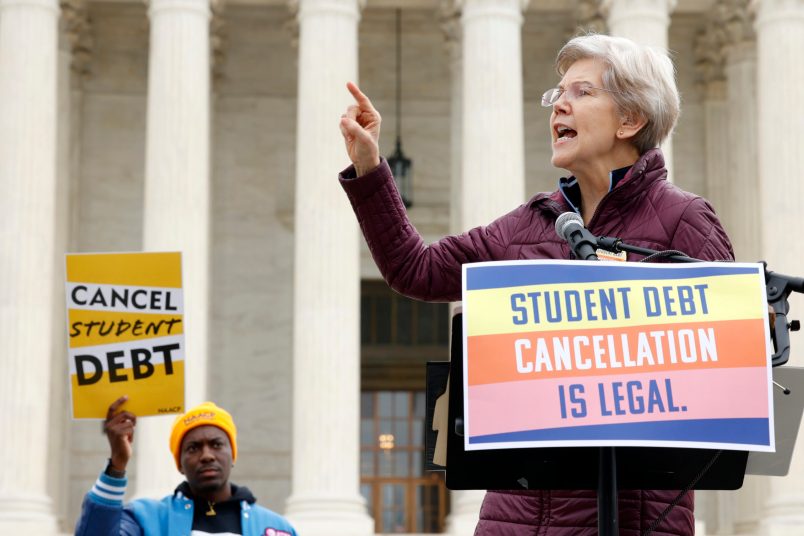Sen. Elizabeth Warren (D-MA) criticized Chief Justice John Roberts’ fixation on the “fairness” of the Biden administration’s student debt relief plan Thursday, which he and his right-wing peers brought up repeatedly during oral arguments earlier this week.
“When Justice Roberts asks about fairness rather than focusing on statutory interpretation or constitutional issues, he’s becoming a super legislator. That’s not his job,” Sen. Elizabeth Warren (D-MA) told TPM. “It is not the role of the United States Supreme Court to make those judgements.”
“And that means this Court is trying to pull more power into itself and away from the elected officials whose jobs it is to make those decisions,” she added. “This is not about a Court that is promoting small government. This is about a Court that is promoting big court.”
Roberts, joined by Justices Samuel Alito and Neil Gorsuch, repeatedly asked the U.S. Solicitor General about the fairness of the plan, with Roberts conjuring up a hypothetical person who forewent college to start a lawn care business to torque up the sympathy.
The liberal justices pushed back.
“Congress passed a statute that dealt with loan repayment for colleges and it didn’t pass a statute that dealt with loan repayment for lawn businesses — so Congress made a choice,” Justice Elena Kagan said, referring to the 2003 law on which the Biden administration’s proposal is based.
The statute in question says that the Secretary “may waive or modify any statutory or regulatory provision applicable to the student financial assistance programs” as the Secretary “deems necessary in connection with a war or other military operation or national emergency.”
Reactions to the arguments from Senate Democrats who champion student debt relief ranged from gloomy to irate.
“I was disappointed,” Sen. Cory Booker (D-NJ) told TPM. “And obviously it’s a majority conservative court that seems to indicate where they may go. So I’m very disappointed.”
Sen. Alex Padilla (D-CA) added that Democrats will have to “keep exploring” other avenues for debt relief, should the Supreme Court knock down the program.
White House Press Secretary Karine Jean-Pierre said Wednesday that the administration does “not have another plan,” and that they believe in the legality of their relief program.
Given the composition of Congress, an effort to pass relief through legislation seems unlikely to succeed. In one of the cases the Supreme Court heard Tuesday on the relief plan, the two plaintiffs — holders of student loan debt who are, in a convoluted argument, trying to knock down the plan to get more relief via a different law — are at least nominally pushing the administration to use different statutory authority to relieve student debt. But the Supreme Court’s hostile posture to executive branch exercises of power, at least while a Democrat lives in the White House, makes such a gambit seem destined to fail.
Warren too declined to engage in hypotheticals about what other pathways to relief might be available, should the Supreme Court invalidate Biden’s plan.
“The President has the legal authority to cancel that debt,” she said. “And I know that because President Trump canceled billions and billions of dollars of student loan debt and not a single Republican lifted a little finger to try to stop it,” she added, raising her pinky to demonstrate.







Is “fairness” a legal term?
INAL.
I guess I’m going to side with Roberts here. Can someone explain why the government can’t pay of my car loan or mortgage?
Because there’s no federal law currently on the books that authorizes it?
(Just guessing.)
The Govmnt can do that. If they are private loans that the Govmnt doesn’t hold, they won’t.
Can you declare bankruptcy and make your mortgage or car loan disappear? Absolutely. So why can’t you do the same with your student loan?
It’s also worth noting that your mortgage and car loan wasn’t foisted on you by on-campus scam artists when you were a teenager.
Fun Fact: The sum of all student debt is greater than the sum of all credit card debt in the US.